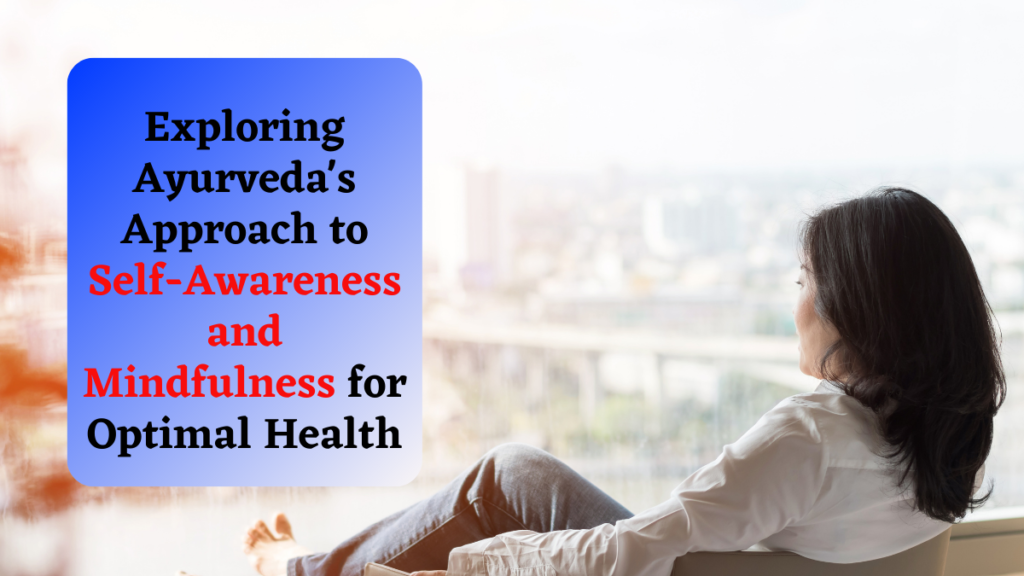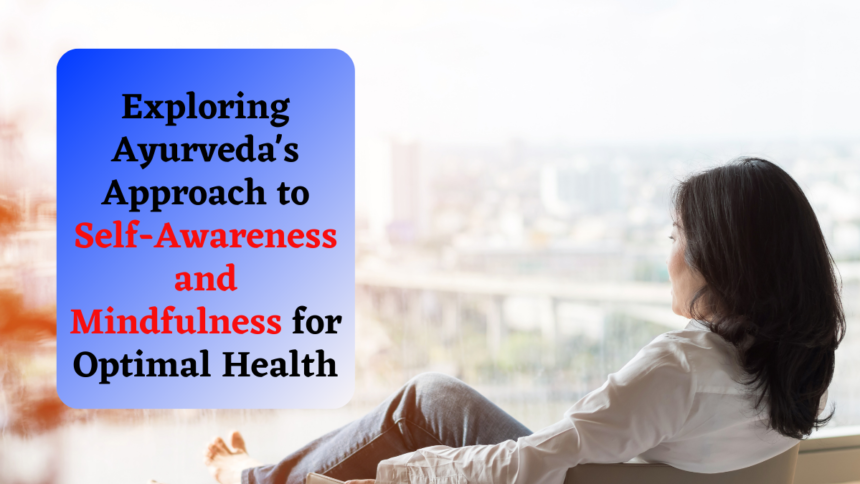Exploring Ayurveda’s Approach to Self-Awareness and Mindfulness for Optimal Health
Introduction:
Ayurveda, an ancient Indian system of medicine, offers profound insights into holistic health, emphasizing the interconnectedness of the body, mind, and spirit. Central to Ayurveda is the cultivation of self-awareness and mindfulness, essential elements in the pursuit of optimal health and well-being. This log delves into how Ayurveda addresses these concepts and their significance in promoting overall wellness.

Understanding Self-Awareness in Ayurveda: In Ayurveda, self-awareness is the cornerstone of personal health management. It involves recognizing one’s unique constitution, known as “prakriti,” which comprises the three doshas: Vata, Pitta, and Kapha. Each individual has a predominant dosha or a combination thereof, influencing physical, mental, and emotional traits.
Through self-awareness practices such as introspection, observation of bodily cues, and understanding one’s tendencies, individuals gain insights into their inherent nature and potential imbalances. Ayurveda emphasizes the importance of aligning lifestyle choices, diet, and daily routines with one’s prakriti to maintain balance and prevent diseases..
Mindfulness in Ayurvedic Lifestyle: Mindfulness, termed as “sati” in Ayurveda, refers to conscious awareness and present-moment attention. It involves being fully engaged in activities, thoughts, and emotions without judgment or attachment. In the context of health, mindfulness enables individuals to cultivate a deep connection with their bodies, minds, and surroundings.
Ayurvedic practices such as yoga, meditation, and pranayama (breath control) serve as powerful tools to enhance mindfulness and promote relaxation. These practices facilitate the release of stress, enhance mental clarity, and foster emotional balance, thus supporting overall health and vitality.
Integration of Self-Awareness and Mindfulness for Optimal Health: Ayurveda emphasizes the integration of self-awareness and mindfulness into daily life practices to achieve optimal health. By developing a profound understanding of their constitution and practicing mindfulness, individuals can make informed choices that nurture their well-being on all levels.
Ayurvedic therapies such as Panchakarma (detoxification). Abhyanga (self-massage), and herbal remedies are tailored to individual needs based on their doshic balance and imbalances. These therapies not only address physical ailments. Also promote mental and emotional harmony, aligning with the holistic principles of Ayurveda.
Conclusion:
In summary, Ayurveda offers a comprehensive approach to self-awareness and mindfulness in the pursuit of optimal health. By recognizing the interplay between body, mind, and spirit, individuals can embark on a journey of self-discovery and transformation. Through conscious lifestyle choices, mindful practices, and personalized therapies. Ayurveda empowers individuals to cultivate balance, vitality, and harmony in their lives.












In return, I would like to extend my support by visiting your website as well. I believe in fostering a sense of community and reciprocity, and I’m eager to see what you have to offer on your platform.
You’re welcome! Thank you for your understanding. If you have any specific questions, topics, or areas of interest you’d like to explore, feel free to share them. Whether it’s about technology trends, scientific discoveries, literary analysis, or any other subject, I’m here to provide information and assistance. Just let me know how I can assist you further, and I’ll be happy to help!